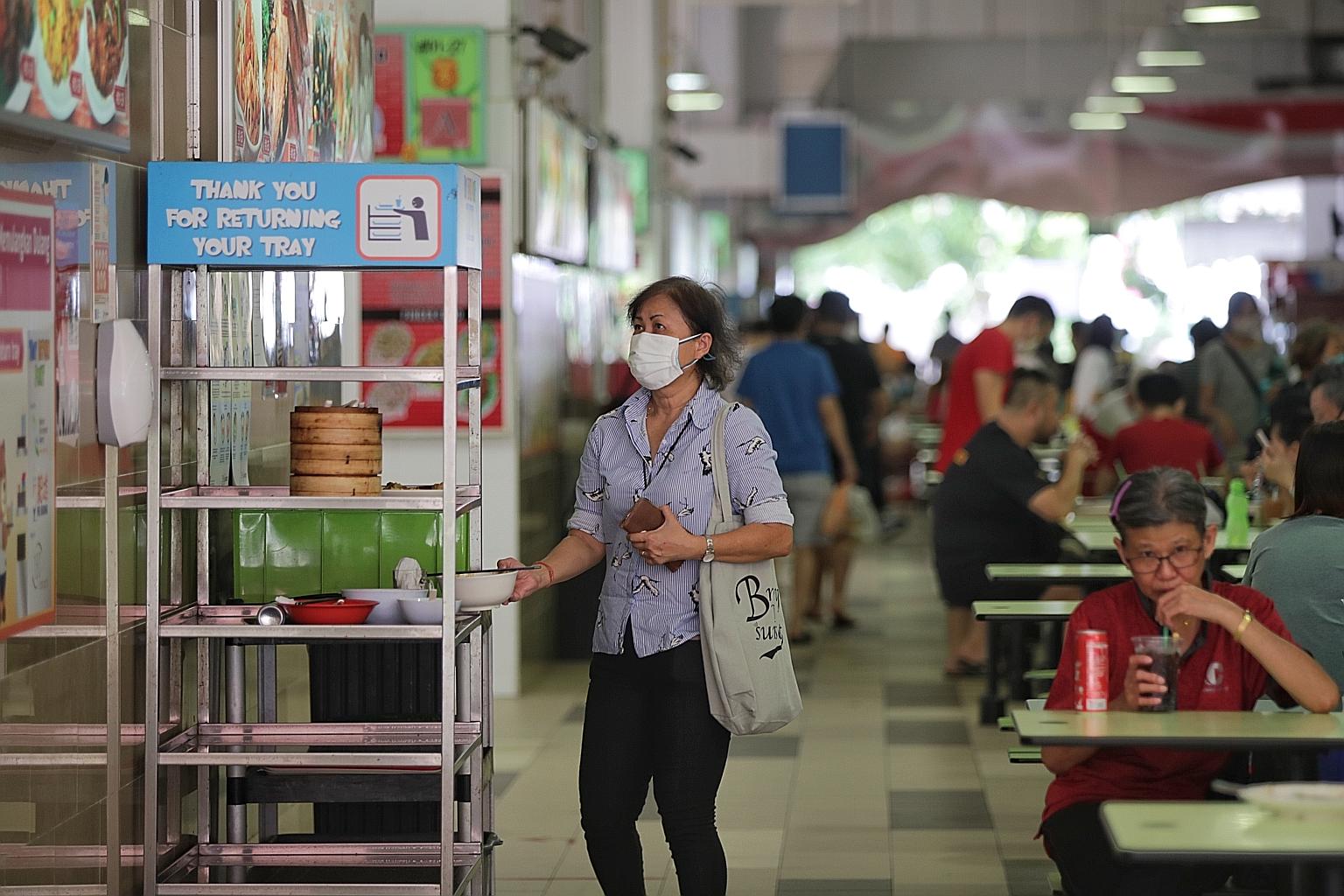Keeping Singapore clean a priority, says Grace Fu
New legislation to be rolled out in next 3 to 6 months will look at improving public hygiene
Sign up now: Get ST's newsletters delivered to your inbox

Diners at hawker centres who take their own trays to cleaning stations after their meals, and do not leave soiled tissues or used masks behind, could be helping to protect cleaners - who are often elderly - from infections.
ST PHOTO: GIN TAY
Keeping Singapore clean will be the priority of the Ministry of Sustainability and the Environment (MSE) in the months ahead, with new legislation to be introduced in the next three to six months.
Ms Grace Fu, Minister for Sustainability and the Environment, said yesterday that Singapore's battle against Covid-19 and dengue had highlighted the importance of public hygiene, vector control, sanitation, quality water and safe food.
"These are all important basic necessities in life that we shouldn't take for granted. And I would like to work on that," she told the media in her first virtual press conference as Minister for Sustainability and the Environment.
Ms Fu had taken over the portfolio from Mr Masagos Zulkifli, who is now Minister for Social and Family Development, during the Cabinet reshuffle last month.
She said the changes to the existing Environmental Public Health Act will look at improving standards of public hygiene, especially in areas with vulnerable users, such as childcare and eldercare facilities.
"I think we have realised that it's not just about the frequency of cleaning, or the number of cleaners we have, but it's really about how we clean better as well," said Ms Fu.
Public cleanliness in Singapore has remained lacklustre despite numerous initiatives encouraging people to clean up after themselves in public areas such as hawker centres.
Asked how the renewed national cleanliness campaign, SG Clean, could change things, Ms Fu said that Covid-19 has elevated expectations of what being clean and hygienic means. For instance, more people are washing their hands with soap and water more often.
One way to raise public hygiene standards is to ensure that hawker centres and coffee shops provide soap and toilet paper for users.
"Sometimes operators, if they're too busy, may overlook simple things like that. So we need to... re-emphasise their importance," she said. "And we're looking at how legislation change can make more effective requirements on the facility or the venue owner."
But customers also have a part to play, she added.
Diners sometimes claim that returning their trays after meals would take away jobs from cleaners, who are often elderly. But with seniors being more vulnerable to infections, including Covid-19, diners could help protect the cleaners by returning their own used crockery to centralised cleaning stations.
"We should look after their interest and their health, because for them to come across soiled tissues and used masks at the hawker centre... it's really not fair to them. That's not a job hazard that they have bargained for," said Ms Fu.
During the hour-long interview, Ms Fu also fielded questions on other sustainability issues.
She highlighted how the renaming of her ministry, formerly the Ministry of the Environment and Water Resources, reflected the growing importance of sustainability here.
"We are coordinating among the ministries to look at how we can put sustainability really at the heart of many of our policies, from investments to energy, transportation and buildings," she said.
There would be job opportunities in these areas, said Ms Fu, citing the growth of sectors such as food production, the circular economy and research into climate science.
She also touched on the growing youth climate movement, and how her experience at the Ministry of Culture, Community and Youth, which she previously helmed, could inform outreach efforts.
She noted that there were ongoing dialogues in her current ministry, such as on Singapore's zero-waste ambitions. She said her experience with the National Youth Council and Youth Action Challenge could come in handy in terms of bringing people with different ideas to the table to discuss issues and understand why certain decisions are made - even if they do not always agree.
"This understanding of policy rationale... is important because, like many of the decisions that we make, it's about trade-offs," she said, adding that these include social or economic trade-offs, or inter-generational equity.
"These are all trade-offs, and there is no right or wrong, but a spectrum. And where we land sometimes may not be ideal or perfect for some groups, but at least I think they will understand as it's because we have made those trade-offs."


